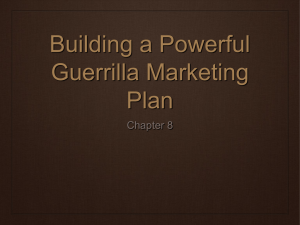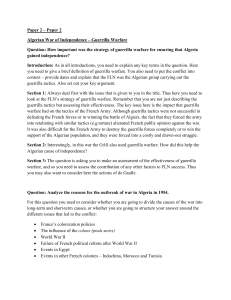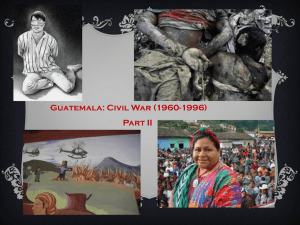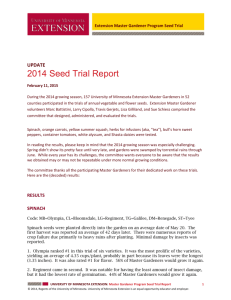Gardeners Help Cities for Free
advertisement
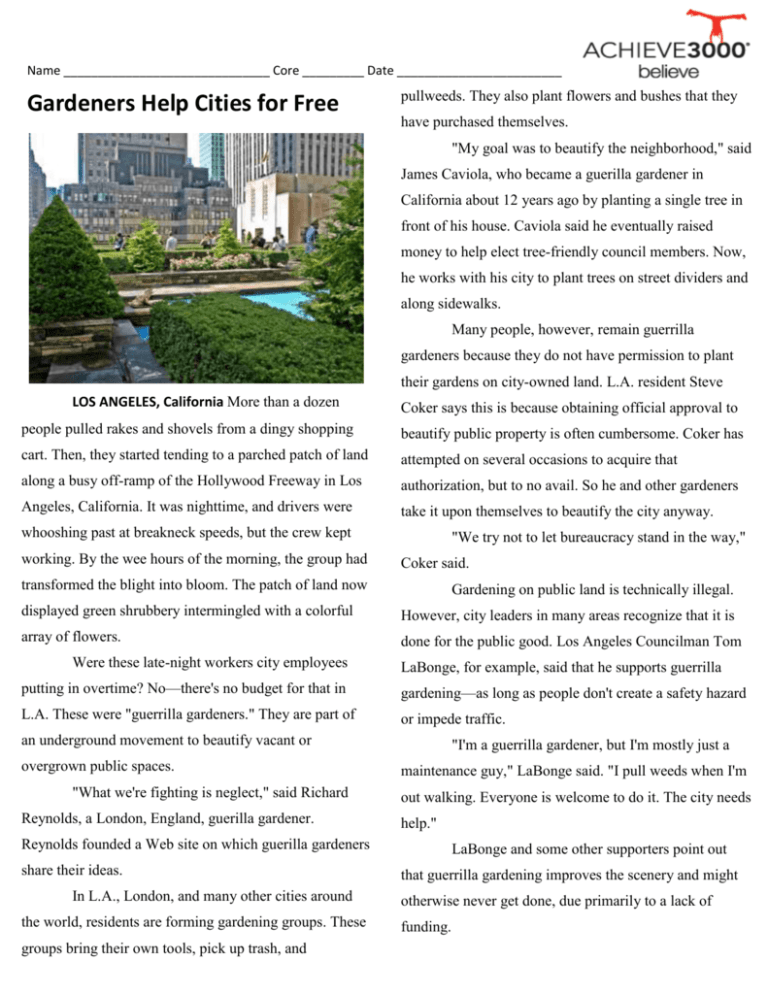
Name ______________________________ Core _________ Date ________________________ Gardeners Help Cities for Free pullweeds. They also plant flowers and bushes that they have purchased themselves. "My goal was to beautify the neighborhood," said James Caviola, who became a guerilla gardener in California about 12 years ago by planting a single tree in front of his house. Caviola said he eventually raised money to help elect tree-friendly council members. Now, he works with his city to plant trees on street dividers and along sidewalks. Many people, however, remain guerrilla gardeners because they do not have permission to plant their gardens on city-owned land. L.A. resident Steve LOS ANGELES, California More than a dozen Coker says this is because obtaining official approval to people pulled rakes and shovels from a dingy shopping beautify public property is often cumbersome. Coker has cart. Then, they started tending to a parched patch of land attempted on several occasions to acquire that along a busy off-ramp of the Hollywood Freeway in Los authorization, but to no avail. So he and other gardeners Angeles, California. It was nighttime, and drivers were take it upon themselves to beautify the city anyway. whooshing past at breakneck speeds, but the crew kept working. By the wee hours of the morning, the group had "We try not to let bureaucracy stand in the way," Coker said. transformed the blight into bloom. The patch of land now Gardening on public land is technically illegal. displayed green shrubbery intermingled with a colorful However, city leaders in many areas recognize that it is array of flowers. done for the public good. Los Angeles Councilman Tom Were these late-night workers city employees LaBonge, for example, said that he supports guerrilla putting in overtime? No—there's no budget for that in gardening—as long as people don't create a safety hazard L.A. These were "guerrilla gardeners." They are part of or impede traffic. an underground movement to beautify vacant or overgrown public spaces. "What we're fighting is neglect," said Richard Reynolds, a London, England, guerilla gardener. "I'm a guerrilla gardener, but I'm mostly just a maintenance guy," LaBonge said. "I pull weeds when I'm out walking. Everyone is welcome to do it. The city needs help." Reynolds founded a Web site on which guerilla gardeners share their ideas. In L.A., London, and many other cities around the world, residents are forming gardening groups. These groups bring their own tools, pick up trash, and LaBonge and some other supporters point out that guerrilla gardening improves the scenery and might otherwise never get done, due primarily to a lack of funding. Some gardeners say that landscaping projects crusade, planting gardens without permission in the hope should not be put off for financial reasons. They say that the city would eventually maintain them. The gardens can be created using native or drought-resistant residents achieved their goal, and the gardens are now plant species that do not require a great deal of effort or maintained by the city's parks and recreation department. funding to maintain. Scott Bunnell, who has cultivated a Other cities around the world are beginning to guerilla garden on a road divider in California for the last follow New York's lead. Reynolds said that Montreal, 10 years, hopes that his efforts demonstrate that low- Canada, is close to sprouting some cooperation between maintenance gardens are possible in Southern California's residents and city officials in the effort to maintain its arid climate. gardens. L.A. gardeners remain hopeful that their city too "Maybe I can help [show] municipalities, cities, and whatnot… that they could make good use of the landscape," he said. will eventually begin maintaining the unauthorized gardens. Until then, devoted guerilla gardeners continue their undercover landscaping efforts. The Hollywood City involvement was the goal of the guerrilla Freeway crew appears eager to recruit new members. A gardening movement when it started in the 1970s in New sign at the edge of the garden closest to a nearby York City. There, residents took up the beautification boulevard reads, "Guerrilla Gardening. Please water me. Dictionary councilman (noun) public (adjective) traffic (noun) a person who works for the people of a city for all people the group of cars and trucks moving along a road trash (noun) things people throw away weed (noun) plant that grows where it is not wanted arid (adjective) avail (noun) very dry success or achievement bureaucracy (noun) rigid and complex rules that often lead to inefficiency guerrilla (adjective) having to do with small groups that try to achieve a goal by disturbing the peace or working against the law impede (verb) to hinder Multiple Choice: Circle the letter of the choice the best completes the statement. (2 points each) 1. According to the article, why did James Caviola originally become a guerilla gardener? A. He wanted to help elect tree-friendly council members in California. B. He hoped to help beautify the California neighborhood in which he lived. C. He hoped to get permission from California officials to plant a single tree. D. He wanted to plant one single tree in front of his house in California. 2. Which is the closest synonym for the word recruit? A. Elevate B. Recollect C. Enlist D. Renew 3. Which question is not answered by the article? A. What are some species of plants that thrive in Southern California's dry climate? B. What is Tom LaBonge's opinion about guerrilla gardening in Los Angeles? C. Why did New York City residents plant guerrilla gardens during the 1970s? D. Why has Los Angeles resident Steve Coker remained a guerrilla gardener? 4. The author probably wrote this article in order to __________. A. Complain about guerrilla gardeners who broke the law in New York City and L.A. B. Complain about the dangerous traffic conditions that can harm guerrilla gardeners C. Tell about how gardeners can easily cultivate lowmaintenance gardens in a dry climate D. Tell about an underground movement in many cities that works to beautify public places 5. What is the first paragraph mainly about? A. The way in which late-night city workers put in overtime shifts to do guerrilla gardening B. A typical example of how guerrilla gardeners are in grave danger from oncoming traffic C. The way in which a parched patch of land can quickly bloom with shrubbery and flowers D. A description of a typical night spent by guerrilla gardeners working to beautify their city 6. The article states: In L.A., London, and many other cities around the world, residents are forming gardening groups. Which would be the closest synonym for the word resident? A. Consumer B. Crusader C. Citizen D. Conveyor 7. Which of these is most important to include in a summary of this article? A. The reason that guerrilla gardeners chose to work right near a busy freeway off-ramp B. The title of the book written by London-based gardener Richard Reynolds C. The reasons why guerrilla gardeners consider their work important D. The name of the Web site founded by Richard Reynolds for guerrilla gardeners 8. Which of these is a statement of opinion? A. Some gardeners say that gardens can be created using native or drought-resistant plants. B. L.A. gardeners can safely assume that their city will follow New York's lead. C. Gardening on public land is technically against the law in many municipalities. D. Councilman Tom LaBonge supports guerrilla gardening if certain conditions are met. Opinion Question: What do you think should cities allow people to plant gardens on public land? (5 points) Thought Question: You just spent a night working with a guerrilla gardening crew. Describe your experience. Use ideas from the article, as well as your own ideas. Use descriptive language in your writing. (5 points) Math- Gardeners plant pink and white flowers near a busy street. Based on the picture, what fraction of the flowers are pink? The answer must be in simplest form.



